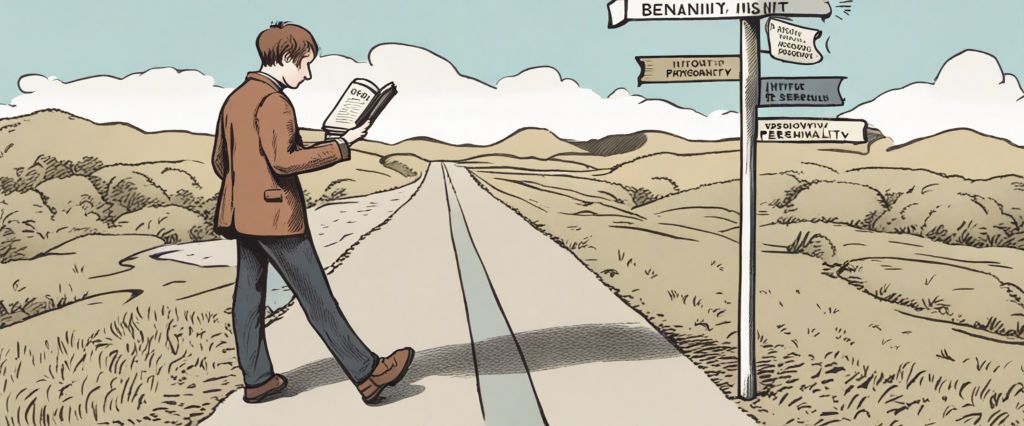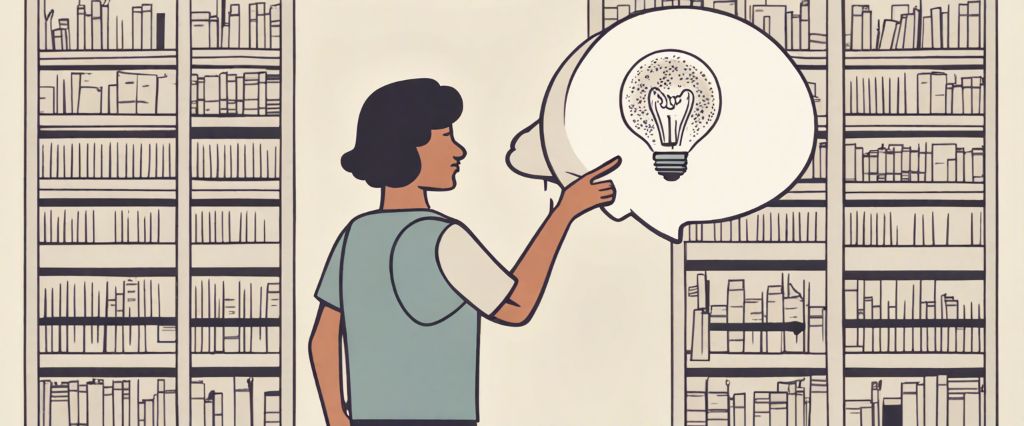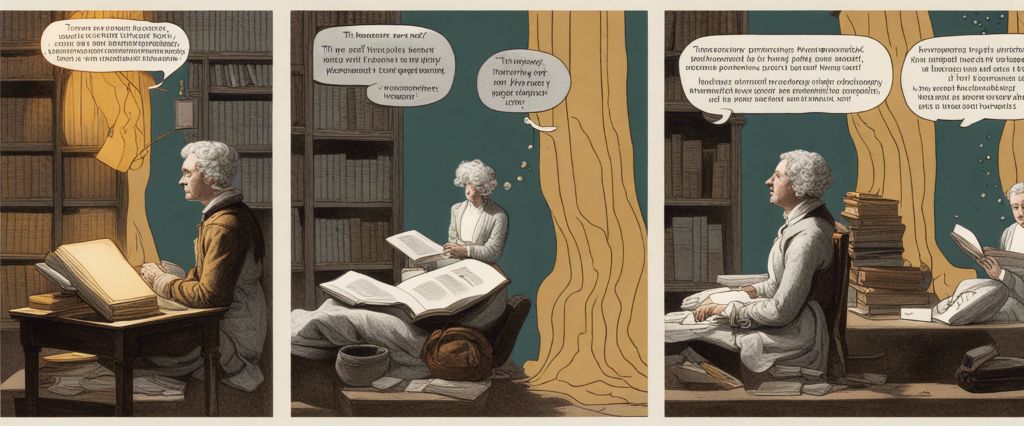
Chapter 1 What's Book Personality Isn't Permanent by Benjamin Hardy
"Personality Isn't Permanent" is a book written by Benjamin Hardy. It challenges the widely accepted belief that personality is a fixed trait and argues that individuals have the power to change and develop their personality throughout their lives. Hardy presents research and personal anecdotes to support his argument and provides strategies and tools to help individuals consciously shape their personalities. The book emphasizes the importance of taking intentional actions to create the desired personality rather than being limited by the beliefs and patterns of the past. Overall, "Personality Isn't Permanent" encourages readers to be active participants in their own personal growth and development.
Chapter 2 Is Book Personality Isn't Permanent A Good Book
"Personality Isn't Permanent" by Benjamin Hardy. The book explores the concept of personality and challenges the belief that personality is fixed and unchangeable. Hardy argues that individuals have the power to intentionally shape their personality to align with their goals and the life they want to lead. It offers practical strategies and insights for personal growth and transformation.
Ultimately, whether the book is considered "good" or not depends on individual preferences and interests. It has received generally positive reviews on platforms such as Goodreads, where it has a rating of 4.18 out of 5 stars based on users' ratings. Many readers found the book to be thought-provoking and inspiring in terms of personal development. It may be worth reading if you are interested in exploring different perspectives on personality and personal growth.
Chapter 3 Book Personality Isn't Permanent by Benjamin Hardy Summary
Personality Isn't Permanent by Benjamin Hardy is a self-help book that challenges the notion that personality is fixed and unchangeable. Instead, Hardy argues that our thoughts, feelings, and behaviors can be transformed through intentional effort and personal growth.
The book begins by debunking common myths surrounding personality, such as the idea that our early experiences and genetics determine who we are for the rest of our lives. Hardy explains that while our past may influence us, it does not define us.
Hardy then introduces the concept of identity, which he defines as the story we tell ourselves about who we are. He explains that by reframing our narrative and actively choosing our beliefs and values, we can shape our identity and, subsequently, our personality.
The author provides practical strategies and exercises to help readers create a new identity and develop their desired personality traits. He emphasizes the importance of setting specific goals, creating daily habits, and surrounding ourselves with supportive environments and people.
Additionally, Hardy explores the role of choice and accountability in personal transformation. He encourages readers to take ownership of their lives and make conscious decisions to align with their desired personality.
Throughout the book, Hardy shares personal anecdotes and examples from his own life, as well as research and insights from psychology and neuroscience. He also includes actionable steps and reflection questions at the end of each chapter, making it a practical guide for implementing the concepts discussed.
Overall, Personality Isn't Permanent challenges the belief that personality is fixed and offers a roadmap for personal growth and transformation. It encourages readers to actively cultivate the qualities and traits they aspire to have, empowering them to shape their own lives and become the best versions of themselves.

Chapter 4 Book Personality Isn't Permanent Author
Benjamin Hardy is an author and organizational psychologist known for his work on personal development, motivation, and success. He released the book "Personality Isn't Permanent: Break Free from Self-Limiting Beliefs and Rewrite Your Story" on June 16, 2020.
Apart from "Personality Isn't Permanent," Benjamin Hardy has written two other books:
- "Willpower Doesn't Work: Discover the Hidden Keys to Success" (2018): In this book, Hardy explores the concept of willpower and explains why it is not enough to achieve lasting change and success. He provides alternative strategies to create an environment conducive to achieving goals and improving oneself.
- "Slipstream Time Hacking: How to Cheat Time, Live More, and Enhance Happiness" (2015): In this book, Hardy reveals various strategies and tactics to increase productivity, leverage time, and make the most out of each day. The goal is to help readers create more time for the things they truly value and enjoy.
In terms of editions, it is subjective to determine the "best" book as it depends on the reader's preferences and needs. However, "Personality Isn't Permanent" has garnered significant attention and praise for its insights into personal growth and transformation. This book challenges the widely held belief that personality is fixed and offers strategies to redefine and recreate oneself.
Chapter 5 Book Personality Isn't Permanent Meaning & Theme
Book Personality Isn't Permanent Meaning
The book "Personality Isn't Permanent" by Benjamin Hardy challenges the commonly held belief that personality traits are fixed and unchangeable. Hardy argues that individuals have the power to shape and transform their personality through intentional actions and personal growth.
The book suggests that personality is not a fixed trait determined solely by genetics or early life experiences. Instead, Hardy proposes that by consciously choosing to adopt new behaviors, beliefs, and habits, individuals can design the kind of personality they desire and achieve personal development.
Hardy emphasizes the importance of setting goals, developing new habits, and acquiring new skills as methods to intentionally change one's personality. He also encourages readers to let go of limiting beliefs and past experiences that may be holding them back from personal growth.
The underlying meaning of the book is to empower individuals to take ownership of their personality and actively shape it in a way that aligns with their values and aspirations. It highlights the potential for personal transformation and provides practical strategies and insights to guide individuals on their journey towards self-improvement.
Book Personality Isn't Permanent Theme
The theme of the book "Personality Isn't Permanent" by Benjamin Hardy is that individuals have the power and ability to change their personality traits and create the person they want to become. The book challenges the commonly held belief that personality is fixed and unchangeable, instead advocating for a growth mindset and intentional personal development. It emphasizes the importance of taking ownership of one's life and actively working towards personal growth and transformation. Through various strategies and techniques, the book provides readers with the tools to break free from limiting beliefs and behaviors, and ultimately design their ideal selves.
Chapter 6 Other Accessible Resources
- Benjamin Hardy's official website: Visit Benjamin Hardy's official website to find resources related to his book, including interviews, videos, blog posts, and articles. (www.benjaminhardy.com)
- Amazon: Check out the book's page on Amazon to read reviews, browse the "Look Inside" feature, and find additional resources such as interviews and podcasts featuring Benjamin Hardy. (www.amazon.com)
- Goodreads: Visit the Goodreads page for "Personality Isn't Permanent" to access reader reviews, quotes, and discussions related to the book. (www.goodreads.com)
- YouTube: Search for Benjamin Hardy's YouTube channel, where you can find videos related to "Personality Isn't Permanent" such as book summaries, author interviews, and talks by Benjamin Hardy.
- Podcasts: Look for podcasts that have interviewed Benjamin Hardy or where he has discussed the concepts and ideas from his book. Platforms like Apple Podcasts, Spotify, and Google Podcasts are great places to start.
- Newspapers and Magazines: Search popular news websites, such as The New York Times, The Washington Post, and Forbes, for articles, interviews, and book reviews on "Personality Isn't Permanent" by Benjamin Hardy.
- Social Media: Follow Benjamin Hardy on platforms like Instagram, Twitter, and Facebook to receive regular updates, articles, and resources related to his book.
- LinkedIn: Connect with Benjamin Hardy on LinkedIn to access professional articles, discussions, and resources related to personal development and the concepts covered in his book.
- Online Forums and Communities: Join online communities, such as Reddit or Quora, dedicated to personal development or psychology, where discussions about "Personality Isn't Permanent" are likely to take place.
- Online Courses and Webinars: Check Benjamin Hardy's website or platforms like Udemy and Coursera for any online courses or webinars he may have conducted on the topics covered in his book. These resources can provide additional in-depth knowledge and insights.

Chapter 7 Quotes of Book Personality Isn't Permanent
Book Personality Isn't Permanent quotes as follows:
- "Your personality is not a fixed trait, but rather a flexible and expansive entity that can be shaped and molded throughout your life."
- "By understanding that your personality is not permanent, you have the power to intentionally design the person you want to become."
- "The key to changing your personality lies in consciously cultivating new habits and behaviors that align with the person you want to be."
- "Don't let your past define your future. Your personality can evolve and grow beyond the limitations of your past experiences."
- "Embrace discomfort and challenge yourself to step outside of your comfort zone in order to foster personal growth and transformation."
- "Instead of accepting your current personality as fixed, start seeing yourself as a work in progress, constantly evolving and improving."
- "Self-awareness is crucial in understanding your current personality and identifying the areas you want to change or improve."
- "Surround yourself with people who embody the qualities and traits you aspire to possess in order to foster personal growth and development."
- "Don't be afraid to let go of preconceived notions about who you are. Embrace the possibility of change and embrace the adventure of becoming a new person."
- "You have the ability to reinvent yourself at any age and stage of life. Your personality is not set in stone, but rather a blank canvas awaiting your artistic touch."
Chapter 8 Similar Books Like Book Personality Isn't Permanent
Book Recommendations for Personal Growth and Transformation
- "Atomic Habits" by James Clear
With an emphasis on small changes that lead to remarkable results, "Atomic Habits" delves into the power of habits and how we can utilize them to transform our lives. Clear provides practical strategies for building good habits and breaking bad ones, guiding readers towards personal growth and long-term success.
- "The Four Agreements" by Don Miguel Ruiz
In this profound spiritual guide, Ruiz shares four principles that can bring profound transformation and happiness into our lives. Drawing from ancient Toltec wisdom, he teaches us the importance of impeccable communication, not taking things personally, and always doing our best.
- "Mindset: The New Psychology of Success" by Carol S. Dweck
Dr. Dweck explores the concept of mindset and its impact on our abilities, success, and personal development. She presents the dichotomy between fixed and growth mindsets, and discusses strategies to cultivate a growth mindset for achieving resilience, learning, and fulfilling potential.
- "The Power of Now" by Eckhart Tolle
If you seek to cultivate mindfulness, presence, and live in the present moment, "The Power of Now" is an essential read. Tolle explores the importance of letting go of the past and future, and embracing the now to find inner peace, happiness, and self-realization.
- "The Alchemist" by Paulo Coelho
A timeless and inspiring tale, "The Alchemist" follows the journey of a young shepherd named Santiago as he searches for his personal legend. Coelho's allegorical storytelling offers profound insights into pursuing our dreams, listening to our hearts, and finding our true purpose.